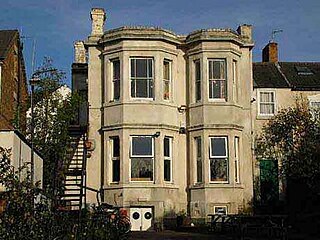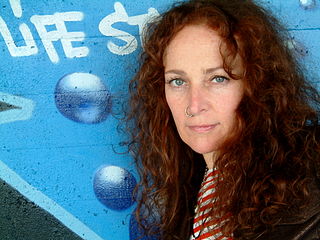
Greenpeace is an independent global campaigning network, founded in Canada in 1971 by a group of environmental activists. Greenpeace states its goal is to "ensure the ability of the Earth to nurture life in all its diversity" and focuses its campaigning on worldwide issues such as climate change, deforestation, overfishing, commercial whaling, genetic engineering, anti-war and anti-nuclear issues. It uses direct action, advocacy, research, and ecotage to achieve its goals.
McDonald's Corporation v Steel & Morris[1997] EWHC 366 (QB), known as "the McLibel case", was an English lawsuit for libel filed by McDonald's Corporation against environmental activists Helen Steel and David Morris over a factsheet critical of the company. Each of two hearings in English courts found some of the leaflet's contested claims to be libellous and others to be true.

Helen Steel is an environmental and social justice activist who is known for her involvement in the McLibel case, an English lawsuit for libel filed by McDonald's Corporation that lasted for 10 years and was eventually taken to the European Court of Human Rights, where Steel and fellow campaigner David Morris won their case against the UK Government on the grounds that they had been denied a fair trial. She is a key figure in the 'Spycops' scandal and subsequent Undercover Policing Inquiry.
Stop Huntingdon Animal Cruelty (SHAC) was an international animal rights campaign to close down Huntingdon Life Sciences (HLS), Europe's largest contract animal-testing laboratory. HLS tests medical and non-medical substances on around 75,000 animals every year, from rats to primates. It has been the subject of several major leaks or undercover investigations by activists and reporters since 1989.

Spanner Films is a small London-based documentary company founded by film director Franny Armstrong in 1997.
Richard Rampton KC was a British libel lawyer. He was involved in several high-profile cases including Irving v. Penguin Books and Lipstadt, where he defended Deborah Lipstadt and Penguin Books against David Irving.

EDF Energy is a British integrated energy company, wholly owned by the French state-owned EDF, with operations spanning electricity generation and the sale of natural gas and electricity to homes and businesses throughout the United Kingdom. It employs 11,717 people, and handles 5.22 million business and residential customer accounts.

The Sumac Centre is a self-managed social centre in Nottingham, UK. It provides resources, meeting spaces and workshops for groups and individuals, and supports campaigning for human rights, animal rights, the environment, and peace. It is part of the UK Social Centre Network and the radical catering group Veggies is based at the centre. It receives no regular funding, the core groups each pay rent that goes toward the mortgage and running costs. Some of the groups are run by volunteers. Its origins can to traced to the Rainbow Centre, which was established in 1984.

Franny Armstrong is a British documentary film director working for her own company, Spanner Films, and a former drummer with indie pop group The Band of Holy Joy. She is best known for three films: The Age of Stupid, a reflection from 2055 about climate change, McLibel, about the McDonald's court case and Drowned Out, following the fight against the Narmada Dam Project.
Covert policing in the United Kingdom is employed to enable an officer of the British police to gather intelligence from and about suspects without alerting them that they are under observation.
The National Public Order Intelligence Unit (NPOIU) was run by the Association of Chief Police Officers (ACPO), a private company connected to United Kingdom police intelligence, and was set up in 1999 to track green activists and public demonstrations. It has been found that much of the Unit's work was against "activists working on social justice, anti-racist, and environmental campaigns" and legitimate dissent, rather than extremist groups, with more than 1,000 political groups having been subjected to surveillance by covert officers. The work of the group has been accused as having hobbled Climate-related protest in the late 2000s in the United Kingdom and more widely.
The Consulting Association (TCA) was a controversial UK business, based in Droitwich, which, from 1993 to 2009, maintained a database of British construction workers and became implicated in a "blacklisting" scandal, which is ongoing. Revelations about the database resulted in the business being shut down, the Employment Relations Act 1999 (Blacklists) Regulations 2010, a Parliamentary enquiry, High Court actions leading to compensation payouts valued at between £50m and £250m in total, and a series of cases being brought to the European Court of Human Rights.
Mark Kennedy, undercover name Mark Stone, is a former London Metropolitan Police officer who, whilst attached to the police service's National Public Order Intelligence Unit, (NPOIU) infiltrated many protest groups between 2003 and 2010 before he was unmasked by political activists as an undercover policeman on 21 October 2010 and his identity was confirmed by the media three days later. During his time under cover he manipulated and deceived several women into having sexual relationships with him with the knowledge of his superiors. An Investigatory Powers Tribunal found his actions to be an "abuse of the highest order" and had "grossly debased, degraded and humiliated" one of his victims.
Robert Lambert MBE is a British academic and former undercover police officer. He served in the controversial Special Demonstration Squad and posed as a left-wing animal rights activist from 1983 to 1988, fathering a child with an activist, who was unaware of his true identity, during his deployment. Both the woman and her child have needed psychiatric treatment as a result, and both have been awarded damages against the Police.
The Special Demonstration Squad (SDS) was an undercover unit of Greater London's Metropolitan Police Service, set up in 1968 with the approval of the Wilson government, to infiltrate British protest groups. It was part of the Special Branch, and worked closely with the Crown Prosecution Service (CPS). It operated from 1968 to 2008.

Louise Wallis is an English DJ, singer, and writer who is also known for her animal advocacy. She lived in London, England, and now resides in South Wales.

Undercover: The True Story of Britain's Secret Police is a 2012 book by The Guardian journalists Rob Evans and Paul Lewis.
Around the end of 2010 and during 2011, it was disclosed in UK media that a number of undercover police officers had, as part of their 'false persona', entered into intimate relationships with members of targeted groups and in some cases proposed marriage or fathered children with protesters who were unaware their partner was a police officer in a role as part of their official duties. Various legal actions followed, including eight women who took action against the Metropolitan Police and the Association of Chief Police Officers (ACPO), stating they were deceived into long-term intimate relationships by five officers, including Mark Kennedy, the first officer to be identified as such, who was publicly identified on 21 October 2010 as infiltrating social and environmental justice campaigns, and Mark Kennedy himself who claimed in turn that he had been incompetently handled by his superiors and denied psychological counselling. According to The Guardian, Kennedy sued the police for ruining his life and failing to "protect" him from falling in love with one of the environmental activists whose movement he infiltrated.

The Undercover Policing Inquiry is an independent statutory inquiry into undercover policing in England and Wales. It was announced by Theresa May, the then Home Secretary, on 6 March 2014, and its terms of reference were published on 16 July 2015. The Inquiry has been chaired by Sir John Mitting since July 2017, following the resignation due to ill-health of Sir Christopher Pitchford.

Housmans is a bookshop in London, England, and is one of the longest-running radical bookshops in the United Kingdom. The shop was founded by a collective of pacifists in 1945 and has been based in Kings Cross, since 1959. Various grassroots organisations have operated from its address, including the Gay Liberation Front, the Campaign for Nuclear Disarmament, and London Greenpeace. Housmans shares its building with its sister organisation Peace News.










